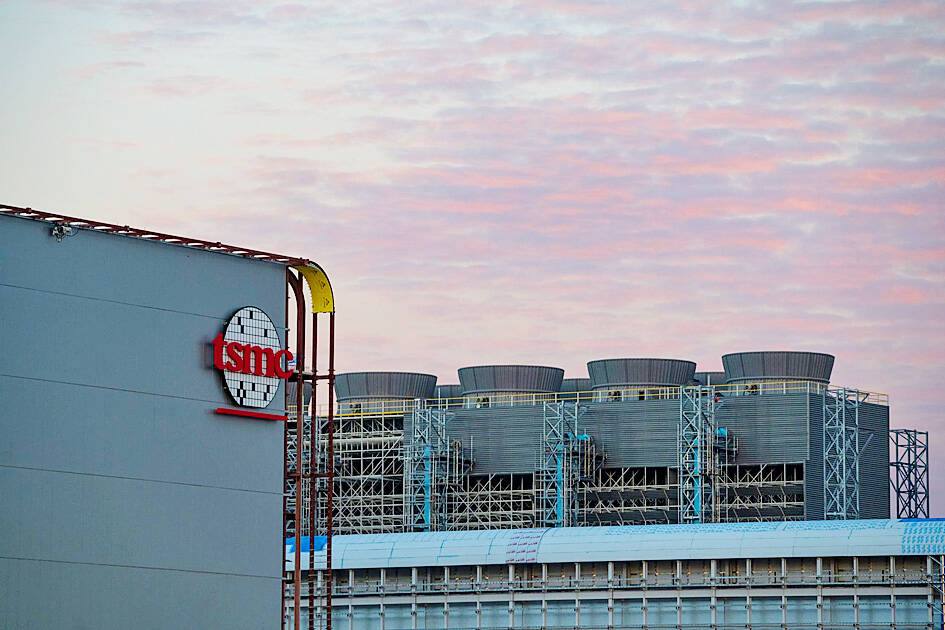Taiwan Semiconductor Manufacturing Co (TSMC, 台積電) has achieved early production yields at its first plant in Arizona that surpass similar factories back home, a significant breakthrough for a US expansion project initially dogged by delays and worker strife.
The share of chips manufactured at TSMC’s facility in Phoenix that are usable is about 4 percentage points higher than comparable facilities in Taiwan, Rick Cassidy, president of TSMC’s US division, told listeners on a webinar on Wednesday, according to a person who participated.
The success rate, or yield, is a critical measure in the semiconductor industry because it determines whether companies would be able to cover the enormous costs of a chip plant.

Photo: Bloomberg
The accomplishment is a sign of progress for Washington’s efforts to revitalize semiconductor manufacturing in the US.
TSMC, the main chip manufacturing partner for Nvidia Corp and Apple Inc, is in line to win US$6.6 billion in US government grants and US$5 billion in loans — plus 25 percent tax credits — to build three fabs in Arizona. The award, like almost all others from the 2022 CHIPS and Science Act, is not yet finalized.
The two other chipmakers at the heart of the tech strategy of US President Joe Biden’s administration — Intel Corp and Samsung Electronics Co — have struggled in the past few months.
Intel, slated to be the biggest beneficiary of the CHIPS Act, is under such severe financial pressure that it is delaying global projects and considering selling assets.
Meanwhile, TSMC has been on a roll.
Its shares reached a record high this month after the chipmaker topped quarterly estimates and raised its target for revenue growth this year.
The latest yield advancement is notable for TSMC, because it has historically kept the most advanced and efficient plants in Taiwan.
Its Arizona site got off to a rocky start, as the company could not find enough skilled staff to install advanced equipment, and workers struggled with safety and management issues.
TSMC reached an accord with construction labor unions late last year.
The chipmaker originally planned to have its first Arizona plant start full production this year, but pushed back the target to next year over the labor issues. It later delayed the start date for its second fab to 2027 or 2028, from an initial target of 2026. That fueled concerns that the company might not be able to make chips in the US as efficiently as in Taiwan.
TSMC could now be keen to expand its US presence further, depending in part on the possibility of more US government backing, Cassidy said, citing early conversations in Washington about a second CHIPS Act.
There is room for at least six fabs at the Phoenix complex.

A magnitude 5.6 earthquake struck off the coast of Yilan County at 12:37pm today, with clear shaking felt across much of northern Taiwan. There were no immediate reports of damage. The epicenter of the quake was 16.9km east-southeast of Yilan County Hall offshore at a depth of 66.8km, Central Weather Administration (CWA) data showed. The maximum intensity registered at a 4 in Yilan County’s Nanao Township (南澳) on Taiwan’s seven-tier scale. Other parts of Yilan, as well as certain areas of Hualien County, Taipei, New Taipei City, Taoyuan, Hsinchu County, Taichung and Miaoli County, recorded intensities of 3. Residents of Yilan County and Taipei received

Taiwan has secured another breakthrough in fruit exports, with jujubes, dragon fruit and lychees approved for shipment to the EU, the Ministry of Agriculture said yesterday. The Animal and Plant Health Inspection Agency on Thursday received formal notification of the approval from the EU, the ministry said, adding that the decision was expected to expand Taiwanese fruit producers’ access to high-end European markets. Taiwan exported 126 tonnes of lychees last year, valued at US$1.48 million, with Japan accounting for 102 tonnes. Other export destinations included New Zealand, Hong Kong, the US and Australia, ministry data showed. Jujube exports totaled 103 tonnes, valued at

BIG SPENDERS: Foreign investors bought the most Taiwan equities since 2005, signaling confidence that an AI boom would continue to benefit chipmakers Taiwan Semiconductor Manufacturing Co’s (TSMC, 台積電) market capitalization swelled to US$2 trillion for the first time following a 4.25 percent rally in its American depositary receipts (ADR) overnight, putting the world’s biggest contract chipmaker sixth on the list of the world’s biggest companies by market capitalization, just behind Amazon.com Inc. The site CompaniesMarketcap.com ranked TSMC ahead of Saudi Aramco and Meta Platforms Inc. The Taiwanese company’s ADRs on Tuesday surged to US$385.75 on the New York Stock Exchange, as strong demand for artificial intelligence (AI) applications led to chip supply constraints and boost revenue growth to record-breaking levels. Each TSMC ADR represents

TRUST: The KMT said it respected the US’ timing and considerations, and hoped it would continue to honor its commitments to helping Taiwan bolster its defenses and deterrence US President Donald Trump is delaying a multibillion-dollar arms sale to Taiwan to ensure his visit to Beijing is successful, a New York Times report said. The weapons sales package has stalled in the US Department of State, the report said, citing US officials it did not identify. The White House has told agencies not to push forward ahead of Trump’s meeting with Chinese President Xi Jinping (習近平), it said. The two last month held a phone call to discuss trade and geopolitical flashpoints ahead of the summit. Xi raised the Taiwan issue and urged the US to handle arms sales to